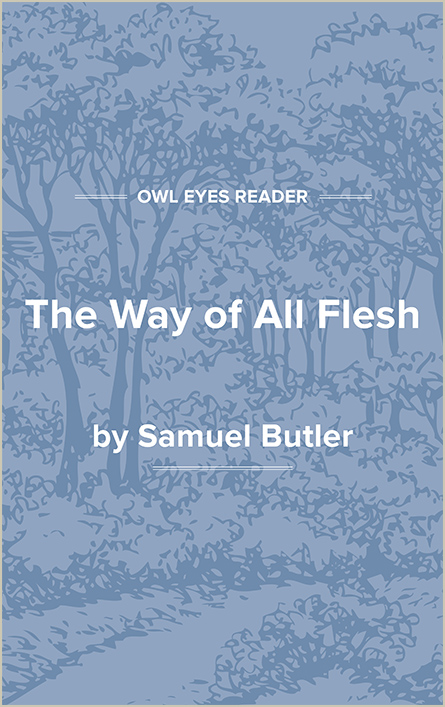Study Guide
Summary
Often autobiographical in nature, a Bildungsroman depicts a protagonist’s coming of age, following the protagonist from youth to maturity while focusing on the forces shaping the young person’s character. While lesser examples of this genre explore just one aspect of a hero’s development—intellectual growth, for instance—the best examples of the genre touch on many areas of growth. By this measure, Samuel Butler’s The Way of All Flesh, which investigates with equal vigor its hero’s intellectual growth, emotional maturation, and spiritual flowering, ranks among the very best of the genre.
The hero who grows, matures, and flowers in The Way of All Flesh is Ernest Pontifex, the pitiable son of a cruel and self-righteous Anglican clergyman. (That Butler was the son of an Anglican cleric hints at the autobiographical nature of the novel.) At birth Ernest is endowed with many positive qualities common to children—cheerfulness, curiosity, self-confidence—but over time these qualities are exorcised (like demons) by a bullying father, to such an extent that by age twenty Ernest has utterly lost his way, living not as his own soul or spirit (his “true self”) counsels but as his parents—representatives of an uncaring society—dictate. However, Ernest will recover, abandoning his father’s path (ordination, marriage, respectability as a clergyman) to map his own way.
At the heart of The Way of All Flesh is a depiction of two sets of forces, one set furthering Ernest’s deterioration, another set contributing to his recovery. The immediate cause of Ernest’s decline is his father, Theobald, a brutish disciplinarian who, having been bullied himself into becoming a cleric (the bully was Theobald’s own father, a miserly publisher who would “shake his will”—that is, threaten disinheritance—to get his way), works to break Ernest’s spirit, the better to make him docile and compliant. Shaping events within the Pontifex household, however, is a vastly more powerful force: the Anglican Church. As presented in The Way of All Flesh, the Anglican Church epitomizes all that is soul-destroying in Victorian society. Staffed (the appropriate word) by careerist clergymen with no interest in spiritual matters, the church exists not to guide the wayward, nor to comfort the distraught, but to prop up an unjust social order. To this end, the Anglican Church espouses a strictly hierarchical view of human existence in which God (through the Bible) dictates to clergyman, clergyman dictates to parent, and parent dictates to child, with the entire system demanding blind obedience by subordinate parties. In effect, the church, through its teachings, encourages in every social sphere a credulous trust in “superiors,” sanctioning such trust by reference to biblical injunctions against disobedience. Within The Way of All Flesh, the harmfulness of church doctrine is evident whenever parent clashes with child, for in all such instances the parent feels duty-bound to crush the child’s will—the ultimate justification being that obedience is a virtue pleasing to God.
The Way of All Flesh presents Victorian England in the worst possible light. In recording Ernest’s deterioration, the novel depicts...
(The entire page is 789 words.)
Owl Eyes subscribers get unlimited access to our expert annotations, analyses, and study guides on your favorite texts. Master the classics for less than $5/month!

